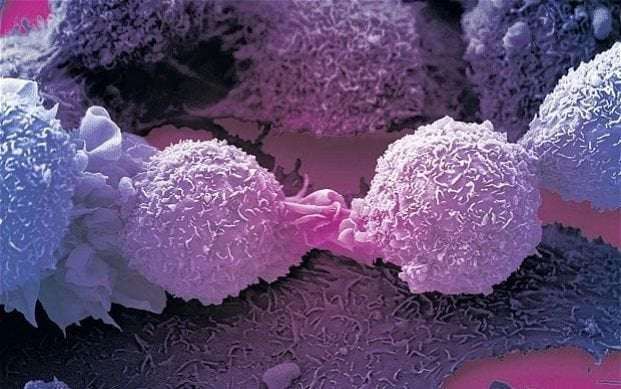A new type of immune cell which kills most cancers has been discovered by accident by British scientists, in a finding which could herald a major breakthrough in treatment.
Researchers at Cardiff University were analysing blood from a bank in Wales, looking for immune cells that could fight bacteria, when they found an entirely new type of T-cell.
That new immune cell carries a never-before-seen receptor which acts like a grappling hook, latching on to most human cancers, while ignoring healthy cells.
In laboratory studies, immune cells equipped with the new receptor were shown to kill lung, skin, blood, colon, breast, bone, prostate, ovarian, kidney and cervical cancer.
Professor Andrew Sewell, lead author on the study and an expert in T-cells from Cardiff University’s School of Medicine, said it was “highly unusual” to find a cell that had broad cancer-fighting therapies, and raised the prospect of a universal therapy.
“This was a serendipitous finding, nobody knew this cell existed,” Prof Sewell told The Telegraph.
“Our finding raises the prospect of a ‘one-size-fits-all’ cancer treatment, a single type of T-cell that could be capable of destroying many different types of cancers across the population. Previously nobody believed this could be possible.”
Asked if it meant that someone in Wales was walking around completely immune to cancer, Prof Sewell said: “Possibly. This immune cell could be quite rare, or it could be that lots of people have this receptor but for some reason it is not activated. We just don't know yet.”
Therapies which engineer immune cells to fight specific types of cancer already exist, but they are currently only useful for some forms of leukaemia, and do not work for solid tumours, which account for most cancers.
Those treatments - known as CAR-T and TCR-T therapies - involve taking immune cells from a patient which are then altered so they can lock onto molecules which sit on the surface of cancer cells.
The cells are then grown in huge numbers and injected back into the patient’s bloodstream.
CAR-T therapy is now given for certain forms of leukaemia but does not work for solid tumours, the vast majority of cancers. TCR-T therapies can work in some other cancers but they need to lock onto molecules called HLA, which vary widely in the population.
In contrast, the new cell attaches to a molecule on cancer cells called MR1, which does not vary in humans.
It means that not only would the treatment work for most cancers, but it could be shared between people, raising the possibility that banks of the special immune cells could be created for instant ‘off-the-shelf’ treatment in future.
When researchers injected the new immune cells into mice bearing human cancer and with a human immune system, they found ‘encouraging’ cancer-clearing results.
And they showed that T-cells of skin cancer patients, which were modified to express the new receptor, could destroy not only the patient’s own cancer cells, but also other patients’ cancer cells in the laboratory.

lpchoe on January 21st, 2020 at 08:13 UTC »
Hoping this will actually help, being cautious because there are so many articles about possible cancer-cures
the-non-wonder-dog on January 21st, 2020 at 08:04 UTC »
Penicillin was discovered by accident and that changed the world.
SoupOnLeapDays on January 21st, 2020 at 07:42 UTC »
Link to journal article.
I wonder if this new T-Cell is prevalent across all populations?